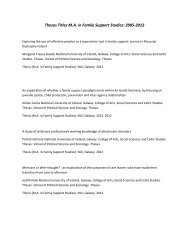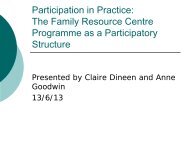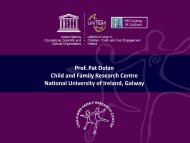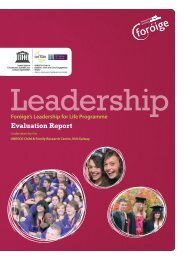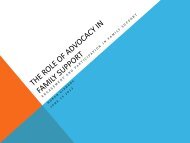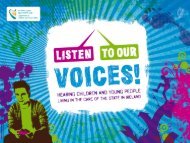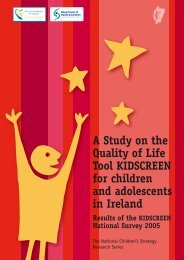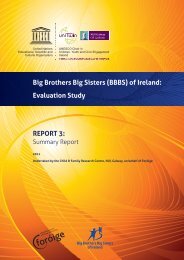Launch brochure - UNESCO Child and Family Research Centre
Launch brochure - UNESCO Child and Family Research Centre
Launch brochure - UNESCO Child and Family Research Centre
Create successful ePaper yourself
Turn your PDF publications into a flip-book with our unique Google optimized e-Paper software.
<strong>UNESCO</strong> Chair in <strong>Child</strong>ren,<br />
Youth <strong>and</strong> Civic Engagement<br />
Professor Pat Dolan<br />
Inaugural Lecture<br />
<strong>Child</strong>ren <strong>and</strong> Citizenship:<br />
Lessons from History,<br />
Messages for the Future<br />
United Nations<br />
Educational,<br />
Scientific <strong>and</strong><br />
Cultural Organization<br />
<strong>UNESCO</strong> Chair in<br />
<strong>Child</strong>ren, Youth <strong>and</strong><br />
Civic Engagement
Contents<br />
Message from Mary McAleese<br />
President of Irel<strong>and</strong><br />
Message from Mr Koïchiro Matsuura<br />
Director-General of <strong>UNESCO</strong><br />
Message from Seán Campbell<br />
CEO Foróige<br />
Message from Dr. James J. Browne<br />
President of NUI Galway<br />
About the <strong>UNESCO</strong> Programme<br />
Inaugural Lecture, Professor Pat Dolan<br />
<strong>UNESCO</strong> Chair<br />
About the <strong>Child</strong> <strong>and</strong> <strong>Family</strong> <strong>Research</strong> <strong>Centre</strong>
UACHTARÁN NA hÉIREANN<br />
PRESIDENT OF IRELAND<br />
MESSAGE FROM<br />
PRESIDENT MCALEESE<br />
This new <strong>UNESCO</strong> Chair for <strong>Child</strong>ren,<br />
Youth <strong>and</strong> Civic Engagement, is a fitting<br />
endorsement by peers worldwide of the important<br />
work that is being done at the <strong>Child</strong> <strong>and</strong> <strong>Family</strong><br />
<strong>Research</strong> <strong>Centre</strong> in NUI Galway to help solve the real<br />
problems experienced by young people <strong>and</strong> families<br />
in our communities. It is also a wonderful example of<br />
a space where theory, policy <strong>and</strong> practice meet, <strong>and</strong><br />
where the focus is also very much on the<br />
commonailty of these challenges to all societies<br />
worldwide.<br />
I congratulate NUI Galway in hosting this prestigious<br />
new <strong>UNESCO</strong> Chair <strong>and</strong> I wish Professor Dolan, as<br />
first Chairholder, together with his partners in<br />
Foróige <strong>and</strong> his colleagues here in Irel<strong>and</strong>, <strong>and</strong><br />
internationally, every success in undertaking this<br />
challenging but worthwhile endeavour.<br />
MARY McALEESE<br />
PRESIDENT OF IRELAND<br />
February 2009
Message from Mr Koïchiro Matsuura,<br />
Director - General of <strong>UNESCO</strong><br />
on the occasion of UNITWIN/<strong>UNESCO</strong><br />
Chairs Programme <strong>and</strong> Irel<strong>and</strong>.<br />
<strong>UNESCO</strong> is delighted to partner with the<br />
National University of Irel<strong>and</strong>, Galway<br />
(NUIG) in the establishment of the<br />
<strong>UNESCO</strong> Chair in <strong>Child</strong>ren, Youth <strong>and</strong><br />
Civic Engagement - the first <strong>UNESCO</strong> Chair<br />
in the Republic of Irel<strong>and</strong>.<br />
The Chair, to be hosted by the NUI<br />
Galway’s <strong>Child</strong> <strong>and</strong> <strong>Family</strong> <strong>Research</strong> <strong>Centre</strong><br />
(CFRC), joins a worldwide programme<br />
of 626 <strong>UNESCO</strong> Chairs <strong>and</strong> 60 UNITWIN<br />
Networks aimed at advancing research,<br />
strengthening human <strong>and</strong> institutional<br />
capacity, <strong>and</strong> fostering inter-university<br />
cooperation in key areas of <strong>UNESCO</strong>’s<br />
m<strong>and</strong>ate.<br />
<strong>UNESCO</strong>’s top priority is achieving quality<br />
Education for All (EFA) <strong>and</strong> the present<br />
Chair promises to contribute to this<br />
ambitious global agenda in a number<br />
of important ways.<br />
Irel<strong>and</strong> has been a pioneer in developing<br />
models for civic education that encourage<br />
young people to think critically about<br />
society <strong>and</strong> their place within it. The new<br />
Chair can help to share knowledge <strong>and</strong><br />
good practices on the promotion of civic<br />
engagement <strong>and</strong> leadership skills among<br />
children <strong>and</strong> youth <strong>and</strong> network Universitybased<br />
research centres <strong>and</strong> NGOs engaged<br />
in these issues. The Chair will give specific<br />
focus to exp<strong>and</strong>ing access to learning <strong>and</strong><br />
life-skills programmes for disadvantaged<br />
children <strong>and</strong> youth, targeting the deep<br />
inequalities in educational opportunity<br />
that continue to undermine progress<br />
towards EFA.<br />
I would like to thank all those who<br />
contributed to the establishment of this<br />
important Chair. I wish to recognize the<br />
support of the Chair’s two key partners in<br />
Irel<strong>and</strong>: the Community Knowledge<br />
Initiative at the NUI Galway <strong>and</strong> the<br />
national youth-based NGO, Foróige.<br />
Let me also congratulate Professor<br />
Pat Dolan on his appointment as the<br />
Chairholder. As Director of the CFRC,<br />
<strong>and</strong> with over 20 years experience in<br />
family support frontline work, policy<br />
<strong>and</strong> research, I am confident that he will<br />
do an excellent job.<br />
The NUI Galway has a longst<strong>and</strong>ing<br />
commitment to civic engagement.<br />
The creation of this Chair is an opportunity<br />
to exp<strong>and</strong> <strong>and</strong> share this expertise for the<br />
benefit of children <strong>and</strong> young people<br />
everywhere, in particular<br />
the most vulnerable <strong>and</strong> marginalized.<br />
Koïchiro Matsuura<br />
Director - General<br />
of <strong>UNESCO</strong>
Message from Foróige<br />
I am in no doubt that our involvement in the <strong>UNESCO</strong><br />
Chair in <strong>Child</strong>ren, Youth <strong>and</strong> Civic Engagement will give<br />
us further opportunity to reach even more young people<br />
in Irel<strong>and</strong> <strong>and</strong> beyond in the years to come.<br />
On behalf of Foróige, National Youth<br />
Development Organisation, I whole<br />
heartedly welcome the establishment of<br />
the <strong>UNESCO</strong> Chair in <strong>Child</strong>ren, Youth<br />
<strong>and</strong> Civic Engagement in NUI Galway.<br />
It is a great <strong>and</strong> fitting testament to the<br />
regard in which NUI Galway is held<br />
internationally <strong>and</strong> to the great work that<br />
is carried out in the <strong>Child</strong> <strong>and</strong> <strong>Family</strong><br />
<strong>Research</strong> <strong>Centre</strong>. It is an honour of the<br />
highest order that Foróige is a partner in<br />
this wonderful initiative <strong>and</strong> I am certain<br />
that the meeting of theory, practice <strong>and</strong><br />
policy that will result from this<br />
partnership will transform the lives of<br />
Young People the World over.<br />
It is with great joy that I congratulate my<br />
colleague <strong>and</strong> friend, Professor Pat Dolan,<br />
on his selection as Chairholder <strong>and</strong> I wish<br />
him every success as he sets out on this<br />
momentous journey. Pat’s ever<br />
deepening commitment to young people<br />
<strong>and</strong> children, particularly those facing<br />
adversity of one form or another, places<br />
him perfectly to ensure that this initiative<br />
is ground breaking <strong>and</strong> has a real <strong>and</strong><br />
lasting impact on generations of young<br />
people. Foróige has been involved in<br />
promoting the value of Youth Leadership<br />
<strong>and</strong> Active Citizenship since 1952, so now,<br />
57 years on, it is with pride <strong>and</strong> pleasure<br />
that we join with Pat <strong>and</strong> his team as we<br />
enter a new era of learning in the field of<br />
<strong>Child</strong>ren, Youth <strong>and</strong> Civic Engagement.<br />
The Civic Engagement of young people<br />
<strong>and</strong> the resulting developmental benefits<br />
is a key component of Foróige’s purpose,<br />
which is, to enable young people to<br />
involve themselves, consciously <strong>and</strong><br />
actively, in their own development <strong>and</strong> in<br />
the development of society. Through the<br />
permanent tsb Foróige Youth Citizenship<br />
Programme, over 10,000 young people<br />
every year make a positive difference to<br />
their communities. This programme<br />
empowers young people, it enhances their<br />
human development <strong>and</strong> it enables them<br />
to realise that they do have the power to<br />
make the world in which they live a better<br />
place. I am in no doubt that our<br />
involvement in the <strong>UNESCO</strong> Chair in<br />
<strong>Child</strong>ren, Youth <strong>and</strong> Civic Engagement<br />
will give us further opportunity to reach<br />
even more young people in Irel<strong>and</strong> <strong>and</strong><br />
beyond in the years to come.<br />
This is indeed a proud day for Irel<strong>and</strong>.<br />
Seán Campbell<br />
CEO Foróige
Foreword by Dr. James J. Browne,<br />
President of NUI Galway<br />
Is mór an chúis onóra do OÉ Gaillimh go<br />
bhfuiltear ag bronnadh na chéad Chathaoireach<br />
<strong>UNESCO</strong> i bPoblacht na hÉireann uirthi.<br />
Bunófar meicníocht fhoirmiúil le<br />
heolas a chruthú agus a mhalartú i<br />
réimse na Leanaí, na hÓige agus an<br />
Chomhpháirteachais Phoiblí i measc<br />
institiúidí ardoideachais agus<br />
eagraíochtaí neamhrialtais, agus idir<br />
na hinstitiúidí agus na heagraíochtaí<br />
sin, go háirithe i gcás tíortha atá i<br />
mbéal forbartha agus tíortha atá ag dul<br />
trí thréimhse athraithe; is gné úrnua é<br />
seo d’obair na hOllscoile. Táimid ag<br />
súil go mbeidh rath ar an gcomhoibriú<br />
seo le <strong>UNESCO</strong> agus tá ríméad orainn<br />
deis a bheith againn cur le ról na<br />
hOllscoile i mbunú comhpháirtíochtaí<br />
sochaí sibhialta.<br />
NUI Galway is particularly honoured<br />
to be awarded the first <strong>UNESCO</strong> Chair<br />
in the Republic of Irel<strong>and</strong>.<br />
The establishment of a formal<br />
mechanism for knowledge creation<br />
<strong>and</strong> exchange in the area of <strong>Child</strong>ren,<br />
Youth <strong>and</strong> Civic Engagement across,<br />
<strong>and</strong> between, institutions of higher<br />
education <strong>and</strong> non-governmental<br />
organisations particularly with<br />
developing countries <strong>and</strong> countries in<br />
transition will bring a new dimension<br />
to the work of the University. We look<br />
forward to fruitful cooperation with<br />
<strong>UNESCO</strong> <strong>and</strong> are delighted to have<br />
this opportunity to enhance the role of<br />
the University in building civil society<br />
partnerships.<br />
The role of the University in the social<br />
fabric is of critical importance to NUI<br />
Galway. As part of this ethos, we have<br />
a specific commitment to embracing<br />
community <strong>and</strong> civic engagement as a<br />
core part of our mission. Currently,<br />
through the Community Knowledge<br />
Initiative, the University is at the<br />
forefront in Irel<strong>and</strong> of pioneering<br />
models for civic engagement including<br />
service learning <strong>and</strong> volunteering<br />
programmes that annually actively<br />
engage over 1,500 NUI Galway<br />
students to think critically about<br />
society <strong>and</strong> their place within it,<br />
locally, nationally <strong>and</strong> internationally.<br />
Over 40 academic staff co-ordinate 25<br />
service learning modules across the<br />
disciplines that engage student<br />
learning with over 80 different<br />
voluntary <strong>and</strong> community<br />
organisations. In addition, NUI<br />
Galway leads a national network<br />
entitled ‘Campus Engage’ which seeks<br />
to evolve civic engagement activities<br />
across higher education in Irel<strong>and</strong>.
The <strong>UNESCO</strong> Chair will provide an<br />
academic portal through which to share<br />
expertise <strong>and</strong> knowledge related to civic<br />
engagement <strong>and</strong> also to gather<br />
international knowledge related to the civic<br />
purpose of higher education <strong>and</strong> its<br />
application at the institutional level.<br />
The <strong>UNESCO</strong> Chair, hosted in the School<br />
of Political Science <strong>and</strong> Sociology, will<br />
strengthen NUI Galway’s international<br />
reputation in Applied Social Science<br />
research. It will be based in the <strong>Child</strong> <strong>and</strong><br />
<strong>Family</strong> <strong>Research</strong> <strong>Centre</strong> which has attained<br />
international recognition for its expertise in<br />
applied practice <strong>and</strong> high quality research<br />
in relation to working with young people<br />
experiencing adversity. Building on these<br />
<strong>and</strong> existing strengths in the Social<br />
Sciences, a huge range of interdisciplinary<br />
research <strong>and</strong> teaching activities are taking<br />
place across this institution to help build a<br />
better, more community based society.<br />
Ensuring greater social inclusion is a major<br />
task, requiring high quality applied<br />
research that influences policy <strong>and</strong> practice.<br />
The activities of the Chair will further<br />
facilitate the emergence of new areas of<br />
research that are concerned with achieving<br />
positive social change within a framework<br />
of civic engagement<br />
On behalf of the University, I gratefully<br />
acknowledge the supporters that have<br />
contributed to research <strong>and</strong> education in<br />
these core areas of strength at NUI Galway<br />
- The Atlantic Philanthropies, the Health<br />
Service Executive <strong>and</strong> Foróige. I warmly<br />
welcome <strong>and</strong> thank our colleagues from<br />
<strong>UNESCO</strong> <strong>and</strong> look forward to a partnership<br />
with potential for building new structures<br />
of co-operation with universities around the<br />
world through an exchange of research,<br />
training <strong>and</strong> policy initiatives.<br />
Cuirim fáilte chroíúil roimh ár<br />
gcomhghleacaithe as <strong>UNESCO</strong> agus táim ag<br />
súil le comhpháirtíocht a mb’fhéidir go<br />
bhféadfaí struchtúir nua a bhunú léi ina<br />
mbeifí ag comhoibriú le hollscoileanna ar<br />
fud an domhain, trí mhalartú taighde,<br />
oiliúna agus tionscnamh beartais.<br />
James J. Browne<br />
Ph.D., D.Sc., MRIA, C.Eng.<br />
Uachtáran - President
<strong>Child</strong>ren,<br />
Youth <strong>and</strong> Civic<br />
Engagement<br />
Core areas of activity for the<br />
<strong>UNESCO</strong> programme launched at<br />
NUI, Galway on March 4, 2009<br />
include <strong>Research</strong>, Teaching,<br />
Advocacy & Policy <strong>and</strong> Programme<br />
Development / Quality Testing<br />
<strong>Research</strong><br />
The research component of the Chair’s<br />
activities builds on the <strong>Child</strong> <strong>and</strong> <strong>Family</strong><br />
<strong>Research</strong> <strong>Centre</strong>’s (CFRC) knowledge <strong>and</strong><br />
expertise in <strong>Family</strong> Support theory <strong>and</strong><br />
practice. The <strong>Centre</strong>’s focus on<br />
preventative <strong>and</strong> supportive measures to<br />
strengthen the capacity of children <strong>and</strong><br />
families undergoing adversity is reflected in<br />
core themes of social support, resilience<br />
<strong>and</strong> social ecology theory, <strong>and</strong> in<br />
conducting applied research that informs<br />
policy <strong>and</strong> practice with a view to<br />
improving the lives of disadvantaged<br />
children <strong>and</strong> youth. Collaboration will take<br />
place nationally <strong>and</strong> internationally with a<br />
range of affiliated universities with<br />
specialist expertise in children <strong>and</strong> youth.<br />
Key research themes that will guide this<br />
work include:<br />
● Looking at the most effective<br />
interventions for enhancing young<br />
people’s civic engagement<br />
● Examining how civic engagement among<br />
young people affects them, for example,<br />
in terms of their aspirations, sense of<br />
social justice, resilience, social support<br />
networks <strong>and</strong> well-being<br />
● Determining the extent to which the<br />
engagement of young people has an<br />
impact on the communities in which they<br />
live, or on broader institutional or societal<br />
dynamics.<br />
Teaching<br />
In the area of education <strong>and</strong> teaching,<br />
activities will include the development of<br />
two international distance MA programmes<br />
<strong>and</strong> specialised PhD training. A new<br />
distance education <strong>UNESCO</strong> Masters in<br />
Youth Leadership <strong>and</strong> Civic Engagement is<br />
planned as part of the NUI Galway<br />
partnership with Foróige in collaboration<br />
with other national <strong>and</strong> international<br />
University partners. The CFRC’s<br />
established MA in <strong>Family</strong> Support Studies<br />
is to be internationalised in countries<br />
prioritised by <strong>UNESCO</strong> <strong>and</strong> delivered via<br />
distance education. A new, structured<br />
cross-national PhD programme in <strong>Child</strong><br />
<strong>and</strong> Youth Studies is planned to prepare<br />
graduates from a range of disciplines to<br />
conduct high quality policy <strong>and</strong> practicerelevant<br />
research <strong>and</strong> programme<br />
evaluation with children <strong>and</strong> young people.<br />
It will include an area of focus on civic<br />
engagement <strong>and</strong> resilience in children<br />
<strong>and</strong> youth.
Advocacy <strong>and</strong> Policy<br />
Among international development agencies,<br />
civic engagement is widely embraced as a<br />
youth intervention. At partner sites in<br />
developing countries <strong>and</strong> states in<br />
transition, the place of civic engagement<br />
will be explored in the context of national<br />
strategies <strong>and</strong> public policies focused on<br />
youth. The outputs from the project will<br />
assist in the development of national <strong>and</strong><br />
cross-national guidelines around youth<br />
civic engagement policy formation,<br />
implementation, <strong>and</strong> evaluation. They will<br />
have relevance for national decision-makers<br />
wishing to formulate civic engagement<br />
policy. Work shall be planned <strong>and</strong><br />
undertaken with youth <strong>and</strong> in coordination<br />
with government <strong>and</strong> non-government<br />
sectors, regional bodies, national youth<br />
NGOs, <strong>and</strong> agents from the private sector<br />
<strong>and</strong> civil society engaged in service delivery.<br />
On the isl<strong>and</strong> of Irel<strong>and</strong>, through<br />
collaboration between the <strong>UNESCO</strong> Chairs<br />
in NUI, Galway <strong>and</strong> the University of<br />
Ulster, this str<strong>and</strong> will establish an<br />
independent monitoring programme on the<br />
wellbeing of children <strong>and</strong> young people<br />
North <strong>and</strong> South. It will develop an<br />
independent, critical analysis of effective<br />
investments, provision <strong>and</strong> outcomes for<br />
children <strong>and</strong> young people by providing a<br />
strong evidence base to inform policy <strong>and</strong><br />
practice in both jurisdictions. The tools<br />
developed will be utilised by <strong>UNESCO</strong> to<br />
provide a template for analysis <strong>and</strong> policy<br />
indicators in other jurisdictions.<br />
Development <strong>and</strong> Quality<br />
Testing of Programmes<br />
A key feature of the incoming Chair’s<br />
programme will involve linking research,<br />
policy <strong>and</strong> practice through the<br />
development, further enhancement <strong>and</strong><br />
quality assurance of child <strong>and</strong> youth<br />
leadership programmes in civic<br />
engagement. The youth programme<br />
activities will be led by the key NGO<br />
partner Foróige, <strong>and</strong> will incorporate best<br />
practice methodologies with due sensitivity<br />
to issues of cultural competence <strong>and</strong><br />
transference among indigenous child <strong>and</strong><br />
youth populations <strong>and</strong> service providers.<br />
The programme interventions will be, in<br />
the main, youth led with a strong emphasis<br />
on youth participation. Also, as there are<br />
many models on civic activity for children<br />
<strong>and</strong> youth among partner countries, quality<br />
assurance on implementation may be the<br />
focus in certain contexts. Specifically,<br />
consultation on the evaluation of youth<br />
mentoring interventions, for instance, the<br />
Big Brother Big Sisters Programme <strong>and</strong> on<br />
volunteering programmes <strong>and</strong><br />
citizenship/leadership programmes will be<br />
made available as models of best practice to<br />
be applied by participating partners. Their<br />
potential in terms of enabling resilience <strong>and</strong><br />
acting as support to disassociated youth at<br />
risk of adversity will be fundamental to the<br />
reciprocal learning planned among partner<br />
NGOs <strong>and</strong> universities.<br />
<strong>Research</strong> Teaching Advocacy<br />
& Policy<br />
Development &<br />
Quality Testing<br />
of Programmes
Professor<br />
Pat Dolan<br />
<strong>Child</strong>ren <strong>and</strong> Citizenship:<br />
Lessons from History,<br />
Messages for the<br />
Future<br />
As John McGahern advocates,<br />
experiencing a ‘precious life is<br />
everything’ <strong>and</strong> is an innate desire for<br />
us all regardless of age, gender, class,<br />
culture, or nationality. This is also the<br />
aspiration that any reasonable, caring<br />
parent has for their child. But while<br />
many young people thrive during<br />
childhood, others sadly do not<br />
experience life as good or safe <strong>and</strong><br />
some more tragically can say they<br />
rarely have a ‘calm journey through<br />
the day’.<br />
In recent years, much international<br />
attention has focused on how best to<br />
support vulnerable children <strong>and</strong> youth<br />
<strong>and</strong> this quest is core to the mission of<br />
<strong>UNESCO</strong>, UNICEF <strong>and</strong> the United<br />
Nations. Clearly, the harsh experience<br />
of many children often dem<strong>and</strong>s<br />
remedial interventions that sometimes<br />
culminate in their removal from their<br />
families <strong>and</strong> communities. On the other<br />
h<strong>and</strong>, with support, children can <strong>and</strong> do<br />
overcome adversity. There is growing<br />
research evidence pointing to the merits of<br />
prevention <strong>and</strong> early intervention delivered<br />
through <strong>Family</strong> Support methods as an<br />
effective approach to social policy <strong>and</strong><br />
service provision particularly in<br />
disadvantaged communities. <strong>Family</strong><br />
Support is about building on the strengths<br />
Summary of the remarks made by Professor<br />
Pat Dolan at the official launch of the <strong>UNESCO</strong><br />
Chair in <strong>Child</strong>ren, Youth <strong>and</strong> Civic Engagement<br />
on March 4, 2009.<br />
“I take the belief that<br />
the best of life is life<br />
lived quietly, where<br />
nothing happens but<br />
our calm journey<br />
through the day,<br />
where change is<br />
imperceptible <strong>and</strong><br />
the precious life is<br />
everything”<br />
- (John McGahern, Memoir, 2005)<br />
of children, their families <strong>and</strong> communities.<br />
It recognises children’s <strong>and</strong> families’ own<br />
strengths as a resource for addressing<br />
problems they face. It emphasises<br />
the importance that networks - formal,<br />
informal <strong>and</strong> semi-formal - have in<br />
enhancing coping capacity among people<br />
undergoing adversity <strong>and</strong> stresses the<br />
importance of interventions that build these<br />
networks. Since its foundation, the work of<br />
the <strong>Child</strong> <strong>and</strong> <strong>Family</strong> <strong>Research</strong> <strong>Centre</strong> at
NUI Galway has focused on advancing<br />
<strong>Family</strong> Support as one key way to help<br />
troubled <strong>and</strong> troublesome children.<br />
Our research <strong>and</strong> teaching programme seeks<br />
to access better knowledge in what works for<br />
those families who experience adversity <strong>and</strong><br />
act as broker between theory <strong>and</strong> practice<br />
in sharing what makes a difference for<br />
children <strong>and</strong> parents who need or use<br />
services. Within the context of<br />
underst<strong>and</strong>ing the centrality of <strong>Family</strong><br />
Support, nuclear <strong>and</strong> extended kinships,<br />
friends, school <strong>and</strong> community resources are<br />
the proven primary sources of help, <strong>and</strong> may<br />
often be unsung <strong>and</strong> overlooked heroes in<br />
the lives of children.<br />
<strong>Family</strong> Support draws on the positive assets<br />
<strong>and</strong> attributes of young people in the context<br />
of their family, school <strong>and</strong> community<br />
settings. <strong>Child</strong>ren have proven capacity to<br />
be civically active in communities where by<br />
from my academic research, I have come<br />
to the conclusion, that civically engaging<br />
children <strong>and</strong> youth produces benefits for all<br />
children. Particularly in the case of children<br />
who are experiencing severe difficulties, their<br />
civic engagement can lead to significant<br />
improvement <strong>and</strong> help rebuild key<br />
relationships in their lives.<br />
Supporting children who experience<br />
adversity <strong>and</strong> disadvantage through<br />
encouraging civic participation has been<br />
advocated for some considerable time.<br />
In the next section, I draw attention to the<br />
emphasis placed by pioneering Irish women<br />
in the early years of the twentieth century<br />
<strong>and</strong> the writer Charles Dickens in<br />
championing the public role <strong>and</strong> value of<br />
children. Through civic engagement,<br />
children’s social support networks improve<br />
<strong>and</strong> this can have profound positive<br />
implications for their coping capacity<br />
Through engagement, children can make a real<br />
difference in the civic life of their communities<br />
<strong>and</strong> at the same time, create space to express<br />
their views <strong>and</strong> engage in decision making.<br />
being supportive to others they benefit<br />
themselves in terms of improved self-esteem,<br />
self-efficacy <strong>and</strong> wellbeing. Through<br />
engagement, children can make a real<br />
difference in the civic life of their<br />
communities <strong>and</strong> at the same time, create<br />
space to express their views <strong>and</strong> engage in<br />
decision making. Indeed, based on my life<br />
experiences, years of direct work with young<br />
people, their parents <strong>and</strong> communities, <strong>and</strong><br />
during childhood <strong>and</strong> later life. These<br />
concepts are explored overleaf. Finally,<br />
the core ideas <strong>and</strong> work programme for the<br />
<strong>UNESCO</strong> programme on <strong>Child</strong>ren Youth<br />
<strong>and</strong> Civic Engagement are described.
Lessons from History<br />
From history, there are several examples where civic<br />
activity by youth has been advocated or where<br />
disadvantaged children have benefited from having<br />
been given leadership roles due to the efforts of<br />
pioneering individuals including philanthropists.<br />
Two examples from Irel<strong>and</strong> demonstrate this interest.<br />
Prior to the formation of the Irish State, the idea of<br />
engaging children as citizens was pioneered<br />
by women such as Constance Countess<br />
Markievicz, Maud Gonne,<br />
Dr Kathleen Lynn, Sinéad de Valera <strong>and</strong><br />
others. It is noteworthy that they did this<br />
over 100 years ago at a time when child<br />
death was common in Irel<strong>and</strong>. At that time,<br />
many children were living in abject poverty,<br />
most notably in Dublin City, which, in the<br />
early 1900s contained some of the worst<br />
slums in Europe. These women advocated<br />
for children when the concept of a child<br />
being seen as ‘individual’ was unheard of.<br />
Specifically, this manifested itself in a<br />
number of ways. By the creation of<br />
Inghinidhe na hÉireann (the Daughters of<br />
Irel<strong>and</strong>), the importance of civic activity <strong>and</strong> youth<br />
leadership was developed throughout Dublin City.<br />
These pioneer women successfully brought 30,000<br />
children to Clonturk Park (sic Croke Park Dublin)<br />
without incident. In a farseeing move, they recognised<br />
children as important <strong>and</strong> having something to offer<br />
to civic society, <strong>and</strong> in effect, gathered children in<br />
Irel<strong>and</strong> (probably for the first time) in order for them<br />
to declare their presence.<br />
While Charles Dickens is most famous for his fictional<br />
depictions of impoverished children <strong>and</strong> their need<br />
for social justice, his role as a philanthropist <strong>and</strong><br />
youth mentor is less known. Dickens worked actively<br />
for the education <strong>and</strong> better living conditions of<br />
children, at the same time he also saw children as<br />
having enormous potential in civic society <strong>and</strong> as<br />
players in their own fortunes. This manifested itself<br />
in his novels, <strong>and</strong> in the two projects for children<br />
which he established <strong>and</strong> supported. For example in<br />
‘Great Expectations’ the young child Pip becomes the<br />
donator of help to the convict Magwitch (who later<br />
becomes his education sponsor). Pip is portrayed as<br />
the source of support to adults in his local<br />
community, in effect a role reversal of children being<br />
seen as pure recipients of help from others <strong>and</strong><br />
society.<br />
Dickens worked<br />
actively for the<br />
education <strong>and</strong> better<br />
living conditions of<br />
children but he also<br />
saw children as<br />
having enormous<br />
potential in civic<br />
society <strong>and</strong> as players<br />
in their own fortunes<br />
Dickens also established the<br />
Urania Cottage Project, a<br />
residential home for homeless<br />
girls in central London. The<br />
Urania Project was unique in<br />
that it operated way ahead of<br />
its time with a culture whereby<br />
residents (many of whom were<br />
teenagers) dictated the rules<br />
<strong>and</strong> regime of the home <strong>and</strong><br />
offered help in return for<br />
receiving help. Furthermore,<br />
while working as a clerk in a<br />
law firm, Dickens was active as<br />
an education mentor to illiterate children in the<br />
“Ragged Schools Project”. The programme operated<br />
in the evenings whereby children would come on to<br />
the street <strong>and</strong> meet mentors with chalk <strong>and</strong> slate <strong>and</strong><br />
be instructed. Notably, Dickens insisted that older<br />
children who benefited from the programme became<br />
mentors to other children in need.<br />
Both Dickens <strong>and</strong> these pioneering Irish women<br />
were therefore strong advocates for children’s rights<br />
<strong>and</strong> for the public presence of young people.<br />
Today, these ideals are echoed in academic research<br />
on civic engagement, social support, <strong>and</strong> resilience<br />
that is drawing attention worldwide to the<br />
significance of social support mechanisms for<br />
disadvantaged children.
Social Support<br />
Social support or ‘acts of assistance between people’<br />
has been described as the ‘bread <strong>and</strong> butter’ of<br />
relationships because its presence is essential to<br />
everyday living. The benefits of having support are<br />
proven <strong>and</strong> manifold. Social support provides a<br />
buffer to stress in that those who can access support<br />
deal with issues better <strong>and</strong> are even less likely to<br />
experience crisis to begin with. It is associated with<br />
better mental health, <strong>and</strong> crucially, from the point of<br />
view of civic engagement, operates on the basis that<br />
Apart from social support <strong>and</strong> resilience, reciprocity<br />
of rights <strong>and</strong> respect for children <strong>and</strong> youth should<br />
not be overlooked as a key underpinning for their<br />
civic engagement. Just like adults, young people have<br />
much to contribute to society, however, this<br />
contribution will be contextualised within the<br />
prevailing culture <strong>and</strong> with regard to how children are<br />
valued. For example, in European countries currently<br />
in transition while there is a tradition of accessing the<br />
opinion of youth, this is not always reflected in<br />
evidence of their being overt active players in<br />
communities. In sub-Sahara countries, gender<br />
A sense of engagement <strong>and</strong> belonging in a community<br />
(geographical or group) is one of the key protective factors<br />
which foster resilience in childhood.<br />
donation of support to others has benefits equal to<br />
that of being a recipient of help. Apart from the<br />
importance of informal sources, social support needs<br />
to be available in different forms <strong>and</strong> levels including<br />
practical <strong>and</strong> emotional sustenance.<br />
Finding ways of enabling children <strong>and</strong> young people<br />
to be more resilient in the face of risk or harm is a<br />
major research concern. Resilience is the capacity to<br />
cope or bounce back in life, it is characterised as the<br />
ability to overcome the odds <strong>and</strong> is typified by being<br />
able to do better than expected. I propose that where<br />
civic engagement is strong <strong>and</strong> social support real <strong>and</strong><br />
available for a young person, conditions for the<br />
enablement of such resilience will be stronger.<br />
A sense of engagement <strong>and</strong> belonging in a community<br />
(geographical or group) is one of the key protective<br />
factors which foster resilience in childhood.<br />
Described as the ordinary magic of daily life, in basic<br />
terms, resilience is aided by having regular<br />
community routines all typically available within a<br />
civic activity <strong>and</strong> engagement context.<br />
difference is often a prominent issue in civic society,<br />
not just in terms of political activation but also in<br />
community contexts. For example, the capacity of<br />
girls in Zambia to engage as active citizens in their<br />
local schools is often muted.<br />
In Irel<strong>and</strong>, the extent to which the voice of<br />
disadvantaged children <strong>and</strong> youth is heard compared<br />
to those who have wealth is an issue. Even at the<br />
basic level of respect, how many young people are<br />
asked to purchase now or leave the restaurant, how<br />
many are skipped in a queue to begin with or how<br />
many when they go on to the street have a high<br />
frequency alarm sound in their ear to keep them<br />
moving. When adults gather to talk in communities it<br />
is described as social capital building, yet when youth<br />
do so it is seen as loitering - <strong>and</strong> this is before we<br />
consider more serious issues of child discrimination<br />
among the disadvantaged.
Messages for the Future:<br />
The <strong>UNESCO</strong> programme on<br />
<strong>Child</strong>ren Youth <strong>and</strong> Civic Engagement<br />
at NUI Galway<br />
The establishment of a <strong>UNESCO</strong> Chair in <strong>Child</strong>ren,<br />
Youth & Civic Engagement will share the expertise<br />
of University-based research centres <strong>and</strong> NGOs<br />
working on educational issues that directly impact<br />
policy <strong>and</strong> practice in this area <strong>and</strong> will bring<br />
together international organisations with a shared<br />
goal of promoting civic engagement <strong>and</strong> leadership<br />
skills among children <strong>and</strong> youth. The project will<br />
deliver a programme of work in civic engagement for<br />
children <strong>and</strong> youth with the objective of providing<br />
relevant expertise in theory, practice <strong>and</strong> policy <strong>and</strong><br />
establishing international links <strong>and</strong> networking in<br />
this field of education. The Chair, in association<br />
with its Irish partners, the Community Knowledge<br />
Initiative at NUI Galway, a student volunteering<br />
programme <strong>and</strong> Foróige, Irel<strong>and</strong>’s leading youth<br />
work NGO, will focus on bringing learning to<br />
international University partners <strong>and</strong> affiliated<br />
centres for children initially in Bulgaria, Lithuania<br />
<strong>and</strong> Zambia, with other participating countries to<br />
follow. Emphasis will be placed on developing <strong>and</strong><br />
sharing practice models <strong>and</strong> on the dissemination<br />
<strong>and</strong> exchange of knowledge among partners.<br />
The project will be framed in the broader context<br />
of the role that research can play in shaping policy<br />
debates <strong>and</strong> informing practice that brings about<br />
better outcomes for disadvantaged children<br />
<strong>and</strong> youth.<br />
Core research questions that will guide the<br />
programme include:<br />
● What assumptions are at play in different countries<br />
regarding young people’s status, rights <strong>and</strong><br />
expectations for their role in society<br />
● What are the ways (mechanisms, programmes,<br />
institutions, processes) in which young people are<br />
able to (<strong>and</strong> in fact) participate civically <strong>and</strong><br />
politically, both formally <strong>and</strong> informally<br />
● What are the barriers to engagement faced by<br />
young people in different contexts<br />
● What are the most effective interventions for<br />
enhancing young people’s civic engagement<br />
● How does civic engagement among young people<br />
affect them, for example, in terms of their<br />
aspirations, sense of social justice, resilience, social<br />
support networks <strong>and</strong> well-being<br />
● To what extent, <strong>and</strong> in what ways, does the<br />
engagement of young people have an impact on the<br />
communities in which they live, or on broader<br />
institutional or societal dynamics
Concluding Messages<br />
Looking ahead, core principles that support youth<br />
policy are stated in the <strong>UNESCO</strong> vision as –<br />
decreasing vulnerability, increasing their social<br />
support systems, supporting the development of their<br />
human <strong>and</strong> social identity <strong>and</strong> helping to achieve a<br />
secure beginning. The mechanism of civic<br />
engagement offers great potential for accomplishing<br />
these objectives. A fundamental component of<br />
national youth policy identified by <strong>UNESCO</strong> is the<br />
“enabling” environment provided to youth <strong>and</strong> the<br />
fulfilment of their civic potential.<br />
Over time, working in collaboration with <strong>UNESCO</strong><br />
partners at the University of Ulster as well as other<br />
Chairs <strong>and</strong> NGOs, we will establish baseline data on<br />
civic engagement levels of youth <strong>and</strong> their wellbeing<br />
in each country which will inform policy-making <strong>and</strong><br />
youth profiles. Through the <strong>UNESCO</strong> office <strong>and</strong> the<br />
project partners, work will be planned <strong>and</strong><br />
undertaken with youth <strong>and</strong> in coordination with<br />
government <strong>and</strong> non-government sectors, regional<br />
bodies, national youth NGOs (mostly led by Fóroige<br />
Irel<strong>and</strong>), <strong>and</strong> agents from the private sector <strong>and</strong> civil<br />
society engaged in service delivery.<br />
Ultimately whereas our activities will centre on<br />
research, policy, advocacy, teaching <strong>and</strong> programme<br />
development, proof of success will be more basic.<br />
Most important, if as a result of the <strong>UNESCO</strong><br />
programme on <strong>Child</strong>ren Youth <strong>and</strong> Civic<br />
Engagement, it can be proven that younger people<br />
are respected, included more, active <strong>and</strong> engaged<br />
citizens in their community, with enhanced social<br />
support networks <strong>and</strong> greater resilience, then the<br />
journey will have been well worthwhile. In the words<br />
of Charles Dickens every child deserves “Great<br />
Expectations” <strong>and</strong> should experience life in the mode<br />
of John McGahern as ‘precious’ <strong>and</strong> with ‘calm<br />
journeys’ through each day.<br />
Pat Dolan<br />
Chairholder - <strong>UNESCO</strong> Chair for <strong>Child</strong>ren,<br />
Youth <strong>and</strong> Civic Engagement<br />
In memory of my parents Mollie <strong>and</strong> Michéal Dolan,<br />
<strong>and</strong> my brother Matt Dolan.<br />
Debates about the role of evidence in influencing<br />
policy <strong>and</strong> the challenges associated with bridging<br />
research, policy <strong>and</strong> practice in international<br />
development will provide the context for planning the<br />
initiative. In this regard, <strong>and</strong> cognisant of the role of<br />
Chairs, as ”think tanks <strong>and</strong> bridge-builders between<br />
research <strong>and</strong> civil society, <strong>and</strong> between research <strong>and</strong><br />
policy making”, the project proposes to work closely<br />
with <strong>UNESCO</strong> in producing research that meets the<br />
needs of policymakers, in entering into dialogue with<br />
policymakers, <strong>and</strong> effectively communicating <strong>and</strong><br />
disseminating findings particularly with a view to<br />
social justice enablement.
About the <strong>Child</strong> <strong>and</strong> <strong>Family</strong><br />
<strong>Research</strong> <strong>Centre</strong><br />
The <strong>Child</strong> & <strong>Family</strong> <strong>Research</strong> <strong>Centre</strong> (CFRC)<br />
is a partnership between the Health Service<br />
Executive <strong>and</strong> the National University of<br />
Irel<strong>and</strong>, Galway. The <strong>Centre</strong>, based in NUI,<br />
Galway’s School of Political Science <strong>and</strong><br />
Sociology was officially launched in 2007<br />
by President Mary McAleese with significant<br />
support from The Atlantic Philanthropies.<br />
In support of its mission to improve<br />
outcomes for children <strong>and</strong> their families, <strong>and</strong><br />
advance practice <strong>and</strong> policy in Irel<strong>and</strong> <strong>and</strong><br />
internationally, the CFRC undertakes<br />
research, education <strong>and</strong> training in the area<br />
of child <strong>and</strong> family care <strong>and</strong> welfare.<br />
The <strong>Centre</strong> is internationally recognised as<br />
a leader in the theory <strong>and</strong> practice of <strong>Family</strong><br />
Support. It is affiliated with a range of<br />
university centres of excellence, NGOs <strong>and</strong><br />
civil society organisations dedicated to<br />
enhancing the welfare of <strong>and</strong> improving<br />
opportunities for disadvantaged children<br />
<strong>and</strong> their families.<br />
The CFRC engages in research, evaluation<br />
<strong>and</strong> service development relating to practice,<br />
policy <strong>and</strong> interventions in the lives of<br />
children. <strong>Research</strong> undertaken is strongly<br />
connected to applied work for children <strong>and</strong><br />
families <strong>and</strong> relevant to a broad range of<br />
stakeholders including service users,<br />
policymakers, <strong>and</strong> frontline staff.<br />
In the area of education <strong>and</strong> training,<br />
the CFRC offers an MA in <strong>Family</strong> Support<br />
studies for professionals working in state<br />
<strong>and</strong> voluntary services on behalf of children<br />
<strong>and</strong> families. Exp<strong>and</strong>ing postgraduate<br />
education activities include a newlyestablished<br />
joint PhD programme with<br />
Trinity College Dublin which will provide<br />
inter-institutional, structured doctoral<br />
training in <strong>Child</strong> <strong>and</strong> Youth research.<br />
Tel: +353 91 495398<br />
Web: www.child<strong>and</strong>familyresearch.ie
<strong>Child</strong> <strong>and</strong> <strong>Family</strong> <strong>Research</strong> <strong>Centre</strong><br />
Science, Engineering <strong>and</strong> Technology Building<br />
National University of Irel<strong>and</strong>, Galway, Irel<strong>and</strong>.<br />
Tel: +353 91 495398 Fax: +353 91 495582<br />
www.child<strong>and</strong>familyresearch.ie



